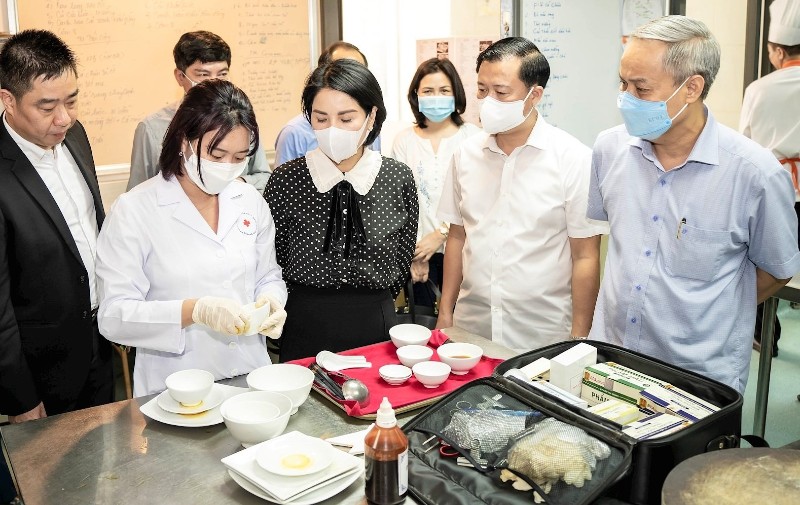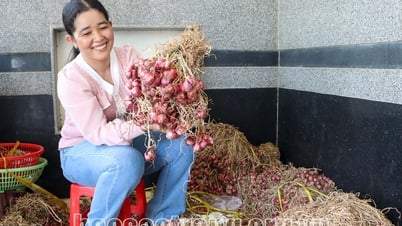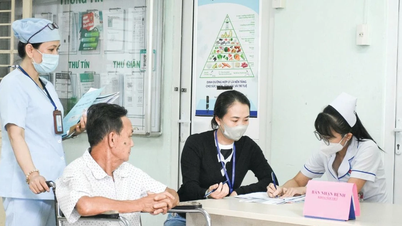In recent years, mass food poisoning cases in schools, hospitals, industrial kitchens and public food processing facilities have been on the rise.
 |
| Authorities inspect a food business. |
According to the Ministry of Health, in 2024, the country recorded more than 130 cases of food poisoning, causing more than 4,700 people to be sick and 23 to die. Compared to the same period last year, the number of poisoning cases increased by nearly 10 cases, the number of people infected increased by more than 2,600.
Food poisoning cases mainly occur in collective kitchens, school canteens, eateries near schools, and street food in provinces such as Khanh Hoa, Dong Nai, Soc Trang, Ho Chi Minh City and Vinh Phuc.
The main causes of mass food poisoning include natural toxins: Poisoning incidents mainly involve toxins from exotic animals such as puffer fish, wild mushrooms, and toads. These foods, when improperly prepared, can cause serious poisoning.
Bacteria such as Salmonella, E. coli, Bacillus cereus, and Histamine are common causes of food poisoning. Unsanitary food preparation and storage create ideal conditions for microorganisms to grow.
Some poisoning cases are related to the use of unsafe chemicals in food production and processing.
Improper food storage in communal kitchens, restaurants or processing facilities can lead to bacterial growth and food poisoning.
Although the number of food poisoning cases this year has increased compared to the past few years, according to Mr. Nguyen Hung Long, Deputy Director of the Department of Food Safety, Ministry of Health, about 10 years ago the number of food poisoning cases was much more terrible, with up to tens of thousands of people infected in some years.
“Saying this is not to justify but to show that compared to previous years, the number of cases of mass food poisoning has decreased significantly thanks to the efforts of relevant agencies, as well as the awareness of business people,” said Mr. Long.
Acknowledging that the problem of mass food poisoning is still a serious one, according to Mr. Long, the Ministry of Health has proposed specific solutions such as stepping up inspection and supervision at food processing facilities, especially collective kitchens. Compliance with food safety and hygiene regulations needs to be monitored more closely.
The Food Safety Department will promote the application of technology to trace the origin of food, helping to detect potential risks early. This will help ensure food quality and prevent poisoning incidents.
Training courses should be provided for food handlers at processing facilities on food hygiene and safety procedures. In addition, consumers should be instructed on how to select, store and prepare food properly.
Food processing establishments that violate food safety and hygiene regulations must be strictly handled according to the law, from suspension of operations to heavy administrative penalties.
Authorities and social organizations need to increase propaganda about food safety. People need to be guided on how to choose safe food, avoid buying food of unknown origin or food that shows signs of spoilage, mold, or spoilage.
Food safety management touches many areas, from agricultural production, food processing, transportation, preservation, to food consumption. Therefore, no agency or organization can manage it independently and effectively.
According to Ms. Tran Viet Nga, Director of the Department of Food Safety, Ministry of Health, in order to manage food safety and reduce cases of collective food poisoning, coordination between ministries and branches such as Health, Agriculture, Industry and Trade, local agencies and social organizations is very necessary to ensure connection in inspection, supervision and handling of violations.
Coordination between agencies can help optimize resources in inspection and supervision, avoiding duplication and shortcomings in inspection activities. When agencies coordinate effectively, inspection processes can take place quickly and synchronously, while ensuring timely and strict handling of violations.
Inter-sectoral coordination does not stop at inspection and violation handling activities but also needs to include propaganda and education to raise public awareness.
Mass media, social organizations and communities will be important partners in communicating food safety information to all levels of people.
When food poisoning cases occur, coordination between authorities such as the Ministry of Health, localities, medical facilities, and consumer protection agencies helps to promptly handle cases, determine causes, and provide solutions.
Inter-sectoral coordination also helps improve warning systems, ensuring information is quickly transmitted to the community to prevent further poisoning incidents.
At the central level, key agencies such as the Ministry of Health, Ministry of Agriculture and Rural Development, Ministry of Industry and Trade, and Ministry of Science and Technology all play important roles in food safety management.
The ministries will closely coordinate in developing legal policies, organizing propaganda and training campaigns, as well as implementing inspection, examination and handling of violations.
Inter-sectoral food safety steering committees also play an important role in coordinating the activities of relevant agencies and monitoring the implementation of management measures.
At the local level, provincial and municipal authorities are the focal points in implementing food safety management.
Provincial food safety agencies, food safety departments, and interdisciplinary inspection teams regularly coordinate with agencies such as the police, health, and agriculture agencies to conduct inspections and handle violations. Coordination between these agencies helps ensure flexibility and speed in monitoring, inspecting, and handling incidents.
The delegations will focus on products consumed during Tet and festivals, especially foods with high risk factors such as meat, fish, eggs, cakes, jams, candies, alcohol, beer, and soft drinks.
Source: https://baodautu.vn/giam-ngo-doc-thuc-pham-tap-the-cach-nao-d238194.html



![[Photo] Prime Minister Pham Minh Chinh starts construction of vital highway through Thai Binh and Nam Dinh](https://vphoto.vietnam.vn/thumb/1200x675/vietnam/resource/IMAGE/2025/5/12/52d98584ccea4c8dbf7c7f7484433af5)

![[Photo] Prime Minister Pham Minh Chinh works with the Standing Committee of Thai Binh Provincial Party Committee](https://vphoto.vietnam.vn/thumb/1200x675/vietnam/resource/IMAGE/2025/5/12/f514ab990c544e05a446f77bba59c7d1)

![[Photo] Prime Minister Pham Minh Chinh receives Swedish Minister of International Development Cooperation and Foreign Trade](https://vphoto.vietnam.vn/thumb/1200x675/vietnam/resource/IMAGE/2025/5/12/ae50d0bb57584fd1bbe1cd77d9ad6d97)





















































































Comment (0)